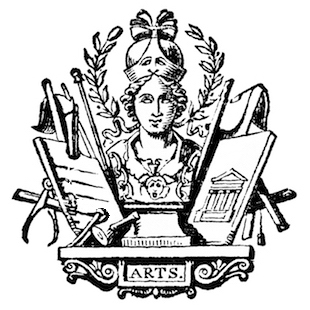The editorial board of the journal “Theory and History of Art” (THA) welcomes openness, benevolence, sociability, and a shared pursuit of knowledge in its relationships with authors and readers.
In accordance with ethical standards and guidelines of publishing papers in international scientific journals, the editorial board of THA proceeds from mandatory principles established for scientific materials concerning authors, reviewers, editorial board members, editors, and publishing staff.
1. Responsibilities of the Authors
1.1. By submitting an article for publishing in THA the authors confirm that this article has not been published elsewhere.
1.2. Authors are responsible for the content of the article. Articles should use only original scientific data. If materials from other researchers are borrowed, appropriate references must be provided. Plagiarism and reproduction of any elements (text, graphics, primary data, etc.) without reference to the original sources are unacceptable.
1.3. The results discussed in the article must meet the criterion of reproducibility. Authors must rely upon justified research methods and present the reliable results.
1.4. Privately obtained information, such as in correspondence, conversation or discussion with third parties, as well as through providing confidential services, may be used or disclosed only with written permission from the source of that information.
1.5. If authors discover a significant error or inaccuracy in their already published article, they should immediately notify the editorial board of THA or the publisher and collaborate with the editorial board to review or correct the article. If members of the editorial board or the publisher learn from a third party that the published work contains a significant error, they should promptly inform the authors. It is the authors’ responsibility to provide corrections or evidence supporting the accuracy of the submitted data as soon as possible.
1.6. Authors may initiate the publication of an article that has already been published in their native language in translation. Such cases will be subject to special consideration at a meeting of THA editorial board under the condition of a mandatory compliance to ethical principles by all parties involved.
1.7. Authors are responsible for specifying the sources of financial support for the project, as well as referring to the individuals contributed to the research.
2. Responsibilitiesof THA Editorial Board
2.1. The editorial board of THA considers previously unpublished articles containing original material or a detailed review on a topic within the scope the journal. If a previously published work appears to overlap with the results of the article under review by more than 50% based on Anti-Plagiarism check, the editorial board reserves the right to refuse the publication.
2.2. The editorial board of THA is responsible for deciding whether to accept or refuse the articles proposed for consideration based on its scientific and practical significance of the material, as well as its compliance with the journal’s requirements.
2.3. Members of the editorial board must not disclose information about articles submitted to review, except to the individuals directly involved in the conducting the research and the publication process.
2.4. In the process of reviewing the editors should thoroughly study the presented unique information, but they are prohibited to use it in their own research or for other personal purposes. The use of such information is permitted only after the article’s official publication.
2.5. Editors are required to monitor the accuracy and correctness of citations in the articles approved for publication.
3. Responsibilities of the Reviewers
3.1. The review process of articles in THA is anonymous. Authors are not informed about the identities of the reviewers. However, if requested by the reviewer and with their written consent, their name may be disclosed to the authors.
3.2. Reviewers should not disclose information about the articles submitted for review to third parties.
3.3. Before publication reviewers are prohibited to use the information presented in the article under review for their own research or other personal purposes.
3.4. If a reviewer is generally positive to the article under review, but has significant comments to make, these comments may be published with the agreement of the editorial board, while the author allows to publicly respond to the reviewer in the journal.
3.5. Reviewers are expected to have provided their scientific review before the deadlines pre-agreed with the editorial board. Should a reviewer be unable to meet the specified terms, they must immediately notify the editor-in-chief.
3.6. When conducting their evaluation, reviewers should aim for the highest level of objectivity. The only criterion for evaluating an article is its scientific significance. If there is any form of conflict of interest between the reviewer and the author, the reviewer must immediately inform the editor-in-chief and decline to review the article.
4. Conflict of Interest
All parties should avoid conflicts of interest in any form at all stages of the publication process. If any conflict of interest takes place, the one having disclosed it must immediately inform the editor-in-chief. The same applies to any violations of generally accepted ethical norms and principles.
In accordance with ethical standards and guidelines of publishing papers in international scientific journals, the editorial board of THA proceeds from mandatory principles established for scientific materials concerning authors, reviewers, editorial board members, editors, and publishing staff.
1. Responsibilities of the Authors
1.1. By submitting an article for publishing in THA the authors confirm that this article has not been published elsewhere.
1.2. Authors are responsible for the content of the article. Articles should use only original scientific data. If materials from other researchers are borrowed, appropriate references must be provided. Plagiarism and reproduction of any elements (text, graphics, primary data, etc.) without reference to the original sources are unacceptable.
1.3. The results discussed in the article must meet the criterion of reproducibility. Authors must rely upon justified research methods and present the reliable results.
1.4. Privately obtained information, such as in correspondence, conversation or discussion with third parties, as well as through providing confidential services, may be used or disclosed only with written permission from the source of that information.
1.5. If authors discover a significant error or inaccuracy in their already published article, they should immediately notify the editorial board of THA or the publisher and collaborate with the editorial board to review or correct the article. If members of the editorial board or the publisher learn from a third party that the published work contains a significant error, they should promptly inform the authors. It is the authors’ responsibility to provide corrections or evidence supporting the accuracy of the submitted data as soon as possible.
1.6. Authors may initiate the publication of an article that has already been published in their native language in translation. Such cases will be subject to special consideration at a meeting of THA editorial board under the condition of a mandatory compliance to ethical principles by all parties involved.
1.7. Authors are responsible for specifying the sources of financial support for the project, as well as referring to the individuals contributed to the research.
2. Responsibilitiesof THA Editorial Board
2.1. The editorial board of THA considers previously unpublished articles containing original material or a detailed review on a topic within the scope the journal. If a previously published work appears to overlap with the results of the article under review by more than 50% based on Anti-Plagiarism check, the editorial board reserves the right to refuse the publication.
2.2. The editorial board of THA is responsible for deciding whether to accept or refuse the articles proposed for consideration based on its scientific and practical significance of the material, as well as its compliance with the journal’s requirements.
2.3. Members of the editorial board must not disclose information about articles submitted to review, except to the individuals directly involved in the conducting the research and the publication process.
2.4. In the process of reviewing the editors should thoroughly study the presented unique information, but they are prohibited to use it in their own research or for other personal purposes. The use of such information is permitted only after the article’s official publication.
2.5. Editors are required to monitor the accuracy and correctness of citations in the articles approved for publication.
3. Responsibilities of the Reviewers
3.1. The review process of articles in THA is anonymous. Authors are not informed about the identities of the reviewers. However, if requested by the reviewer and with their written consent, their name may be disclosed to the authors.
3.2. Reviewers should not disclose information about the articles submitted for review to third parties.
3.3. Before publication reviewers are prohibited to use the information presented in the article under review for their own research or other personal purposes.
3.4. If a reviewer is generally positive to the article under review, but has significant comments to make, these comments may be published with the agreement of the editorial board, while the author allows to publicly respond to the reviewer in the journal.
3.5. Reviewers are expected to have provided their scientific review before the deadlines pre-agreed with the editorial board. Should a reviewer be unable to meet the specified terms, they must immediately notify the editor-in-chief.
3.6. When conducting their evaluation, reviewers should aim for the highest level of objectivity. The only criterion for evaluating an article is its scientific significance. If there is any form of conflict of interest between the reviewer and the author, the reviewer must immediately inform the editor-in-chief and decline to review the article.
4. Conflict of Interest
All parties should avoid conflicts of interest in any form at all stages of the publication process. If any conflict of interest takes place, the one having disclosed it must immediately inform the editor-in-chief. The same applies to any violations of generally accepted ethical norms and principles.
Ethical principles of the publication.
Responsibility of the authors, the editorial board of
the journal "Theory and History of Art" and reviewers
Responsibility of the authors, the editorial board of
the journal "Theory and History of Art" and reviewers





